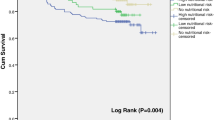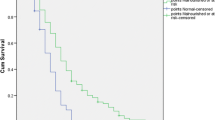Summary
Rational nutritional support shall be based on nutritional screening and nutritional assessment. This study is aimed to explore nutritional risk screening and its influencing factors of hospitalized patients in central urban area. It is helpful for the early detection of problems in nutritional supports, nutrition management and the implementation of intervention measures, which will contribute a lot to improving the patient’s poor clinical outcome. A total of three tertiary medical institutions were enrolled in this study. From October 2015 to June 2016, 1202 hospitalized patients aged ≥18 years were enrolled in Nutrition Risk Screening 2002 (NRS2002) for nutritional risk screening, including 8 cases who refused to participate, 5 cases of same-day surgery and 5 cases of coma. A single-factor chi-square test was performed on 312 patients with nutritional risk and 872 hospitalized patients without nutritional risk. Logistic regression analysis was performed with univariate analysis (P<0.05), to investigate the incidence of nutritional risk and influencing factors. The incidence of nutritional risk was 26.35% in the inpatients, 25.90% in male and 26.84% in female, respectively. The single-factor analysis showed that the age ≥60, sleeping disorder, fasting, intraoperative bleeding, the surgery in recent month, digestive diseases, metabolic diseases and endocrine system diseases had significant effects on nutritional risk (P<0.05). Having considered the above-mentioned factors as independent variables and nutritional risk (Y=1, N=0) as dependent variable, logistic regression analysis revealed that the age ≥60, fasting, sleeping disorders, the surgery in recent month and digestive diseases are hazardous factors for nutritional risk. Nutritional risk exists in hospitalized patients in central urban areas. Nutritional risk screening should be conducted for inpatients. Nutritional intervention programs should be formulated in consideration of those influencing factors, which enable to reduce the nutritional risk and to promote the rehabilitation of inpatients.
Similar content being viewed by others
References
Kruizenga HM, Wierdsma NJ, van Bokhorst MA, et al. Screening of nutritional status in the Netherlands. Clin Nutr, 2003,22(2):147–152
Jie B, Jiang ZM, Nolan MT, et al. Impact of nutritional support on clinical outcome in patients at nutritional risk: a multicenter, prospective cohort study in Baltimore and Beijing teaching hospitals. Nutrition, 2010,26(11-12): 1088–1093
Wham C, Dyall L, Teh R, et al. Nutrition risk: cultural aspects of assessment. Asia Pac J Clin Nutr, 2011,20(4):632–638
Johansen N, Kondrup J, Plum LM, et al. Effect of nutritional support on clinical outcome in patients at nutritional risk. Clin Nutr, 2004,23(4):539–550
Sorensen J, Kondrup N, Prokopowicz J, et al. EuroOOPS: an international, multicentre study to implement nutritional risk screening and evaluate clinical outcome. Clin Nutr, 2008,27(3):340–349
Jiang ZM, Chen W, Zhan WH, et al. Parenteral and enteral nutrition application in west, middle and east China: A multi-center investigation for 15098 patients in 13 metropolitans using Nutritional Risk Screening 2002 tool (abstract). Clin Nutr, 2007,2(Suppl 2):133–134
Lochs H, Allison SP, Meier R, et al. Introductory to the ESPEN guidelines in enteral nutrition: terminology, definitions and general topics. Clin Nutr, 2006,25(2):180–186
Li SY, Yu JH, Zeng L, et al. Nutritional risk screening and nutritional support in hospitalized patients. J Nurs Sci (Chinese), 2016,31(21):99–102
Castel H, Shahar D, Harman-Boehm I. Gender difference in factors associated with nutritional status of older medical patients. J Am Coll Nutr, 2006,25(2):128–134
Fang S, Long J, Tan R, et al. A multicentre assessment of malnutrition, nutritional risk, and application of nutritional support among hospitalized patients in Guangzhou hospitals. Asia Pac J Clin Nutr, 2013,22(1):54–59
Braam W, Smits MG, Didden R, et al. Exogenous melatonin for sleep problems in individuals with intellectual disability: a meta-analysis. Dev Med Child Neurol, 2009,51:340–349
McCall WV. Diagnosis and management of insomnia in older people. J Am Geriatr Soc, 2005,53:S272–S277
Belafsky PC, Mouadeb DA, Rees CJ, et al. Validity and Reliability of the Eating Assessment Tool (lEAT-10). Ann Otol Rhinol Laryngol, 2008,117(12):919–924
Rasmussen HH, Kondrup J, Staun M, et al. Prevalence of patients at nutritional risk in Danish hospitals. Clin Nutr, 2004,23(5):1009–1015
Wang J, Luo B, Xie Y, et al. Evaluation methods on the nutritional status of stroke patients. Eur Rev Med Pharmacolo Sci, 2014,18(24):3902–3907
Jie B, Jiang ZM, Nolan MT, et al. Impact of nutritional support on clinical outcome in patients at nutritional risk: a multicenter, prospective cohort study in Baltimore and Beijing teaching hospitals. Nutrition, 2010,26(11-12): 1088–1093
Burden ST, Hill J, Shaffer JL, et al. Nutritional status of preoperative colorectal cancer patients. J Hum Nutr Diet, 2010,23(4):402–407
Ligthart-Melis GC, Weijs PJ, te Boveldt ND, et al. Dietician-delivered intensive nutritional support is associated with a decrease in severe postoperative complications after surgery in patients with esophageal cancer. Dis Esophagus, 2013,26(6):587–593
Kondrup J, Allison SP, Elia M, et al. ESPEN Guidelines for nutrition screening 2002. Clin Nutr, 2003,22(4):415–421
Department of Health, State of Western Australia. Digestive health network: home enteral nutrition model of care. Perth: Health Networks Branch, Department of Health, Western Australia,2010.
Author information
Authors and Affiliations
Corresponding author
Additional information
This project was supported by Soft Science Application Program of Wuhan Scientific and Technological Bureau of China (No. 2016040306010211).
Rights and permissions
About this article
Cite this article
Li, Sy., Yu, Jh., Diao, Zf. et al. Analysis on nutritional risk screening and influencing factors of hospitalized patients in central urban area. J. Huazhong Univ. Sci. Technol. [Med. Sci.] 37, 628–634 (2017). https://doi.org/10.1007/s11596-017-1782-0
Received:
Revised:
Published:
Issue Date:
DOI: https://doi.org/10.1007/s11596-017-1782-0




